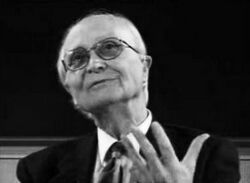Biography:Gilles-Gaston Granger
From HandWiki
Short description: French philosopher
Gilles-Gaston Granger | |
|---|---|
 Gilles Gaston Granger at the Conservatoire national des arts et métiers, Paris, 2000. | |
| Born | 28 January 1920 Paris |
| Died | 24 August 2016 (aged 96) |
| Alma mater | École Normale Supérieure |
| Era | Contemporary philosophy |
| Region | Western philosophy |
| School | Analytic philosophy[1] |
| Institutions | Collège de France (1986–1990) |
Main interests | Philosophical logic, philosophy of science, epistemology |
Notable ideas | Philosophy of style |
Influences
| |
Influenced
| |
Gilles-Gaston[2] Granger (/ɡrɑːnˈʒeɪ/; French: [ɡʁɑ̃ʒe]; 28 January 1920 – 24 August 2016) was a French philosopher.
Work
His works discuss the philosophy of logic, mathematics, human and social sciences, Aristotle, Jean Cavaillès, and Ludwig Wittgenstein.
He produced the most authoritative[3] French translation of Wittgenstein's Tractatus Logico-Philosophicus and published more than 150 scientific articles.[4]
In 1968 he co-founded with Jules Vuillemin the journal L'Âge de la Science.[4] He was president of the scientific committee of Jules Vuillemin's Archives.[5]
Biography
- Studied at École Normale Supérieure, Paris, France. Associate in philosophy, bachelor in mathematics, doctorate in philosophy.
- 1947–1953: Professor at the University of São Paulo, Brazil .
- 1953–1955: Associate professor at the Centre National de la Recherche Scientifique (CNRS).
- 1955–1962: Professor at the University of Rennes.
- 1962–1964: Director of the École Normale Supérieure d'Afrique Centrale, in Brazzaville, Republic of the Congo.
- 1964–1986: Professor at the Université de Provence, Aix-en-Provence, France.
- 1986: Professor at the Collège de France. Chair of Comparative Epistemology.
- 1990: Professor emeritus of the Collège de France.
- 2000: Invited professor at the Conservatoire National des Arts et Métiers.[6]
Works
- Méthodologie économique (PUF, 1955)
- La raison (1955)
- La mathématique sociale du marquis de Condorcet (PUF, 1956)
- Pensée formelle et sciences de l'homme (Aubier, 1960)
- Formal Thought and the Sciences of Man, translation by Alexander Rosenberg (Boston Studies in the Philosophy of Science, 1983)[7]
- Essai d'une philosophie du style (Armand Colin, 1968)
- Wittgenstein (Seghers, 1969)
- La théorie aristotélicienne de la science (Aubier, 1976)
- Langage et épistémologie (Klincksieck, 1979)
- Pour la connaissance philosophique (Odile Jacob, 1988)
- Invitation à la lecture de Wittgenstein (Alinéa, 1990)
- La vérification (Odile Jacob, 1992)
- Le probable, le possible et le virtuel (Odile Jacob, 1995)
- L'irrationnel (Odile Jacob, 1998)
- La pensée de l'espace (Odile Jacob, 1999)
Notes and references
- ↑ Alan D. Schrift (2006), Twentieth-Century French Philosophy: Key Themes and Thinkers, Blackwell Publishing, p. 76.
- ↑ Usually written "Gilles Gaston" in French. "Gilles" was his alias in the Resistance, which he kept after the war. Claudine Tiercelin, "La mort du philosophe Gilles-Gaston Granger", Le Monde, 5 September 2016.]
- ↑ Gallimard had published a first translation by Pierre Klossowski but later published Granger's translation.
- ↑ 4.0 4.1 Bibliography.
- ↑ Jules Vuillemin's Archives.
- ↑ Gilles Gaston Granger, "Rationalité et raisonnement", Université de tous les savoirs, 1, p. 215–222, Editions Odile Jacob, Paris, 2000.
- ↑ Excerpts on Google Books.
External links
- Gilles Gaston Granger. "La contradiction", Travaux du Centre de Recherches Sémiologiques, 57, p. 39–53, 1988 (in French)
- Biography, list of works, on the site of the Collège de France (in French)
- Bibliographie (in French)
- Lacour, Philippe. Gilles-Gaston Granger et la critique de la raison symbolique (in French)
- Lacour, Philippe. Le concept d'histoire dans la philosophie de Gilles-Gaston Granger (in French)
 |


